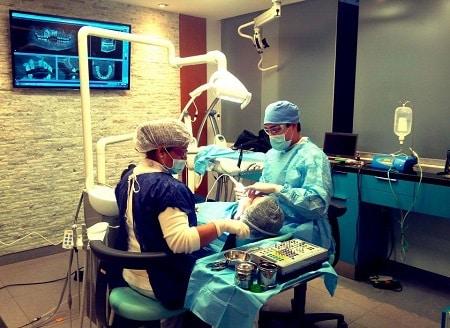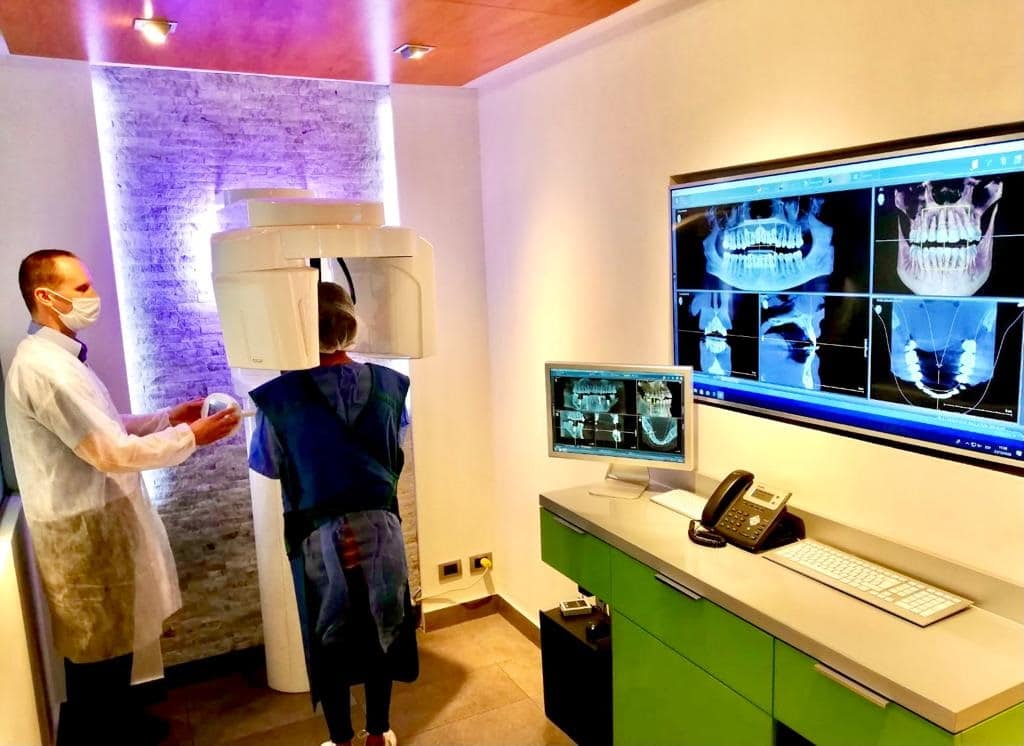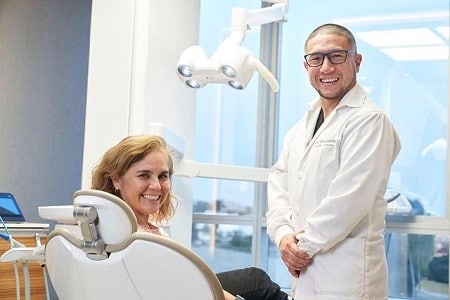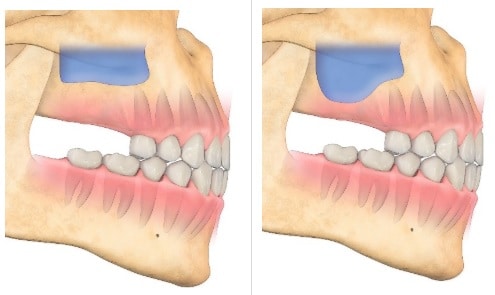Sure, no one relishes the idea of getting oral surgery. However, there are many reasons that may warrant surgical dental intervention. This can include teeth with infections, severe decay, broken teeth, bone loss, tooth loss, and gum problems. Consequently, oral surgery could be necessary.

Nuestra moderna unidad dental para cirugía oral, con Drs Daniel Yuen y Dr Jung Song Park
Oral Surgery – Teeth Extractions
For example, teeth extractions can be required if a tooth suffers severe trauma, is damaged, cracked, split or presents other symptoms that cause pain. However, most dentists can perform simple tooth extractions using only local anesthesia.
We also offer oral sedation, a sedative that makes you relax and very sleepy during the treatment. Consequently, the entire process is comfortable with NO pain.

First things first: A detailed diagnosis with 3D imaging gives us a 100% accurate diagnosis. Our dental tomography scan and integrated software is included in our consultation fee.
Oral Surgery – Wisdom Teeth Extractions
On the other hand, wisdom teeth, also known as third molars, are the last teeth to develop. These can be very difficult and complex teeth extractions. Especially as wisdom teeth often grow at odd angles and are in close proximity to the main nerve that runs through the lower jaw. These teeth can grow inwards towards the tongue, outwards towards the cheek or lie flat at a ninety-degree angle!
Most importantly, it is necessary that a specialist maxillofacial surgeon does this procedure. A maxillofacial surgeon has special training and is more capable of performing a successful treatment, avoiding crucial nerves that run through the lower jaw.

Dr Alfredo Zuiko is our specialist Maxillofacial surgeon
Interestingly, some people never develop wisdom teeth while others only have one, two or three instead of all four!

Oral Surgery – Dental Implants
Meanwhile, and to replace a missing tooth or a tooth that needs to be extracted, a dental implant is the best option. This acts as a new root to which a tooth (crown) is later placed. The dental implant is ‘implanted’ into the jaw bone where it heals for at least three months. Later, a connector is attached to the final crown to hold the tooth to the implant post. Dental implants are the best way to replace missing teeth. Read more here.

Oral Surgery – Sinus Lift
Also, some patients may require a sinus lift if teeth have been missing in the upper jaw for a considerable time. A sinus lift could also be used if you have severe periodontal (gum) disease. Tooth loss causes bone loss because there is no support for tissue or bone if the teeth are missing. Over time, the bone reabsorbs and disappears. This is called bone atrophy.
In order to place dental implants and recover this area, a sinus lift with bone graft is needed.
The sinus lift process is a delicate oral surgery which involves separating the membrane from the floor of the maxillary sinus. Lifting the sinus allows the insertion of a bone graft to make the bone thick enough and capable of supporting a dental implant.
In some circumstances and if conditions are ideal, a sinus lift, bone graft, and dental implant can be placed on one appointment. This is beneficial because the whole area heals at the same time without the need for a second surgery to later place the implant. This also means you only take one set of medication without repeating the same prescription at a later date.

Missing teeth in the upper jaw cause the sinus cavity to ‘fall’ and bone to to reabsorb. A sinus lift creates new bone and space for dental implants. This restores a patients smile and bite.
Reconstructive Dental Surgery
Sports and other injuries can result in knocked-out teeth and facial injuries which make even the most basic routines a challenge, e.g eating. Reconstructive dental surgery has the purpose of replacing missing teeth, damaged teeth, treating jawbone, gum damage and correcting joint issues.

This patient required root canal treatment, bone graft, sinus lift and dental implants to restore his smile.

A fabulous final result!
Invasive oral surgery is performed under general anesthesia so that the patient does not experience discomfort.
As with any oral surgery, there is always a recovery period with some swelling and sensitivity which is considered totally normal and to be expected. Recovery-related pain will be treated with prescription drugs to alleviate these symptoms and avoid complications. Read more about dental reconstruction by clicking here.
Orthognathic Surgery
If your jaws are not properly aligned, this can cause problems with function as well as appearance. Oral surgery is always necessary in this case.
Orthognathic corrective jaw surgery must be carefully planned because of the intricacies of occlusion and the combined effect of the facial appearance when the teeth and jaw move.
Orthodontics (braces) can often correct bite problems when only the position of the teeth is the issue. However, if the maxilla and mandible jaw bones are not aligned, then orthognathic surgery should be considered.

OK, so I’m interested in Oral Surgery! What’s the next step?
For additional information or to schedule an appointment with one of our Specialists, please contact us. Leave us a message asking for a video call or a regular call, and we’ll be back with you shortly.
On the other hand, if you use WhatsApp, then this is safe, fast, and effective for rapid communication.


How much notice do you need for an appointment for extraction and dental implant? I need to know the cost quickly, so I can make an appointment. I would like to do this in one visit if possible.